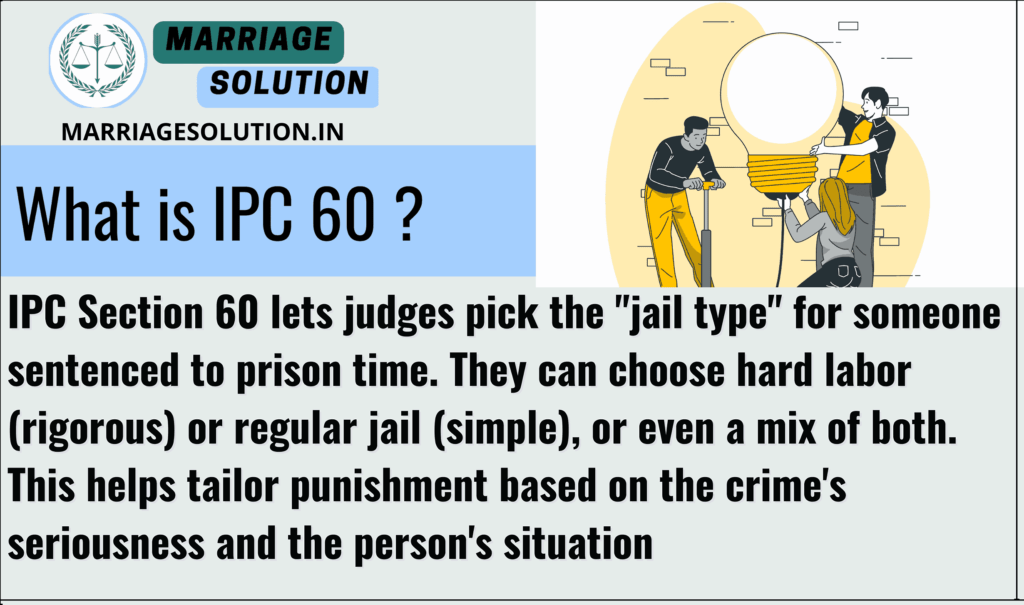Introduction of IPC 60
The Indian Penal Code (IPC) outlines various punishments for crimes. IPC Section 60 focuses on a specific aspect of sentencing for those receiving jail time: the type of imprisonment. This section empowers the court to choose between two options, ensuring a more nuanced approach to punishment.
What is IPC Section 60 ?
IPC Section 60 lets judges pick the “jail type” for someone sentenced to prison time. They can choose hard labor (rigorous) or regular jail (simple), or even a mix of both. This helps tailor punishment based on the crime’s seriousness and the person’s situation

Section 60 IPC Explanation
The Indian Penal Code (IPC) establishes various punishments for criminal offenses. IPC Section 60 specifically focuses on an important aspect of sentencing: determining the type of imprisonment an offender will face.
Key Points of IPC Section 60:
- Court’s Discretion in Imprisonment Type: This section empowers the court to choose the type of imprisonment for an offender sentenced to jail time. The options are:
- Rigorous Imprisonment: This involves hard labor and more challenging living conditions compared to simple imprisonment.
- Simple Imprisonment: This does not involve hard labor and provides for less harsh living conditions.
- Factors Influencing the Choice: The judge considers several factors when deciding between rigorous and simple imprisonment. These factors may include:
- Severity of the Crime: More serious offenses often warrant rigorous imprisonment.
- Criminal History: Repeat offenders might be sentenced to rigorous imprisonment.
- Age and Health of the Offender: Rigorous imprisonment may be deemed unsuitable for certain individuals.
- Potential for Rehabilitation: The court may choose an imprisonment type that encourages the offender to become a law-abiding citizen.
- Flexibility in Sentencing: IPC Section 60 allows the court to further tailor the sentence by:
- Combining Imprisonment Types: The judge can choose a combination of rigorous and simple imprisonment within the overall sentence duration.
- Focus on Reform: Ultimately, the goal of choosing between rigorous and simple imprisonment is to promote rehabilitation and deter future crimes.
60 IPC bailable or not ?
offense is bailable or not. It deals with the court’s discretion in determining the nature and place of imprisonment upon sentencing. Therefore, IPC 60 itself does not dictate the bailability of an offense; instead, it provides guidelines for the court’s decision-making process regarding sentencing.
Section 60 IPC in short information
| Offence | Definition | Punishment | Bailable/Non-Bailable |
|---|---|---|---|
| Type of Imprisonment (IPC 60) | Court’s discretion to decide between rigorous (with hard labor) or simple imprisonment, or a combination of both, for offenses punishable by imprisonment. | Depends on the specific offense and the sentence awarded under the relevant IPC section. | Not applicable (IPC 60 deals with the type of imprisonment, not the bailability of the offense). |
IPC 60 FAQs
What is IPC Section 60?
It deals with the remission of punishments, allowing for their reduction or modification under specific conditions.
What conditions must be met for remission to be granted?
Specific legal conditions outlined in the law must be met for remission to be justified.
If you need support with court proceedings or any other legal matters, don’t hesitate to reach out for assistance.
Court or any other marriage-related issues, our https://marriagesolution.in/lawyer-help-1/ website may prove helpful. By completing our enquiry form and submitting it online, we can provide customized guidance to navigate through the process effectively. Don’t hesitate to contact us for personalized solutions; we are here to assist you whenever necessary!
